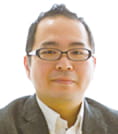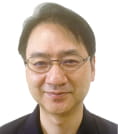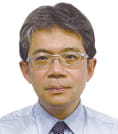- JST Home
- /
- Strategic Basic Research Programs
- /
 CREST
CREST- /
- Research Director/
- Large-scale genome synthesis and cell programming/
- [Genome programming] Year Started : 2018
[Genome programming] Year Started : 2018
Hiroshi Abe
Development of chemistry-based synthetic methodology for genome scale DNA
Grant No.:JPMJCR18S1
Research Director
Hiroshi Abe

Professor
Graduate School of Science
Nagoya University
Collaborator
| Kiyoshi Asai | Professor Graduate School of Frontier Sciences The University of Tokyo |
| Natsuhisa Oka | Associate Professor Faculty of Engineering Gifu University |
Outline
We will develop chemistry-based synthetic methodologies for genome-scale DNA as follows; 1. Highly precise PCR, 2. Novel DNA assembly method , 3. Chemical ligation enabling construction of DNA containing repeat sequences, 4. Highly precise and efficient phosphoramidite chemistry, 5. New algorithm for designing DNA fragments suitable for these synthetic methods. We will establish precise and automatable synthetic methodology for genome-scale DNA by developing these core technologies.
Akihiro Ohkubo
Development of an innovative flow method for chemical synthesis of genomic DNAs
Grant No.:JPMJCR18S2
Research Director
Akihiro Ohkubo

Associate Professor
School of Life Science and Technology
Institute of Science Tokyo
Outline
In this research, we will carry out “Improvement of an efficient method for synthesis of long DNA oligomers”, “ Development of a high-throughput flow system for chemical synthesis of genomic DNAs” and “Evaluation of photosynthetic efficiency of cyanobacteria having modified genes of photosynthetic pigments” by using our DNA phosphoramidite method without base protection and techniques for preparation of a slide glass immobilizing porous glasses at high density.
Kunihiro Ohta
Development of minimum genome renovation technology using TAQing system
Grant No.:JPMJCR18S3
Research Director
Kunihiro Ohta

Professor
Graduate School of Arts and Sciences
The University of Tokyo
Outline
This research is aimed to develop a new technology to produce artificial cells of excellent traits by introducing the minimum genomic renovation. For this aim, genome-reformation technology called “TAQing system” will be employed to generate proto-artificial cells with various useful traits. The key information from sets of phenotype-genotype will be collected, and utilized for the design of minimal modifications to genome and synthesized huge DNA (extra genome) which enable expression of new traits in designed-artificial cells with the minimum genome renovation.
Yasuhiro Kazuki
Genome writing and application using human/mouse artificial chromosome
Grant No.:JPMJCR18S4
Research Director
Yasuhiro Kazuki

Professor
Chromosome Engineering Research Center
Tottori University
Collaborator
| Junichiro Ohzeki | Project Assistant Professor The Exploratory Research Center on Life and Living Systems National Institutes of Natural Sciences |
| Teruhiko Suzuki | Chief Researcher Department of Basic Medical Science The Tokyo Metropolitan Institute of Medical Science |
| Kazuma Tomizuka | Professor School of Life Sciences Tokyo University of Pharmacy and Life Sciences |
| Eiji Mizutani | Associate Professor Faculty of Medicine University of Tsukiba |
Outline
We have constructed a human artificial chromosome (HAC) and a mouse artificial chromosome (MAC) that can autonomously replicate and distribute in mammalian cells. Using the HAC/MAC technology, we have also succeeded the generation of transchromosomic mice with Mb-sized human gene cluster. In this research, we will perform the development of fundamental technologies to efficiently introduce Mb-sized synthetic DNA into target cells using the HAC/MAC technology, and develop the basic technologies for ‘the elucidation of operative principle of genome sequence’ and ‘the industrial and medical applications’.
Katsuhiko Shirahige
Innovative research for design and use of functional artificial chromosomes
Grant No.:JPMJCR18S5
Research Director
Katsuhiko Shirahige

Professor
Institute for Quantitative Biosciences
The University of Tokyo
Outline
In this research, we aim to understand how to design a very long piece of DNA in order to make it function as genetic information in human and other mammalian cells. Particularly, we investigate the mechanisms of gene regulation. We also develop a method to introduce a long DNA molecule into cells. Our research will enable us to establish the effective way to re-write human/mammalian genome, thereby facilitating research and development via synthetic biological approaches in medicine and animal husbandry.
Masayki Su’etsugu
Cell-free on-chip genome synthesis
Grant No.:JPMJCR18S6
Research Director
Masayki Su’etsugu

Professor
Graduate School of Science Field of Study
Rikkyo University
Outline
The genome synthesis so far relies on living host cells for large DNA cloning, and thus is labor intensive and time consuming. In this research, we will develop a cell-free on-chip technology for synthesis of artificial genomes. To achieve this goal, we use our original enzymatic tools for DNA assembly and DNA propagation. These tools will be integrated into micro-bioreactor to enable high-throughput and nanoscale synthesis of large DNA molecules. We will also develop methods for genome transplantation in bacteria, and thereby evaluate the function of the artificially synthesized genomes.
Asako Sugimoto
Genomic changes that drive evolution of reproductive modes
Grant No.:JPMJCR18S7
Research Director
Asako Sugimoto

Professor
Graduate School of Life Sciences
Tohoku University
Collaborator
| Taisei Kikuchi | Professor Graduate School of Frontier Sciences The University of Tokyo |
| Kohta Yoshida | Specially-appointed Professor Brain Rsearch Institute Niigata University |
Outline
The Phylum Nematoda contains a great diversity of species that vary in modes of reproduction (e.g., gonochorism, hermaphroditism, and parthenogenesis). In this research, we aim to identify genomic changes that drive evolution of reproductive modes in nematodes, by comparative and functional genomic analyses using multiple nematode species. We further aim to manipulate nematode genomes to artificially switch their reproductive modes.













